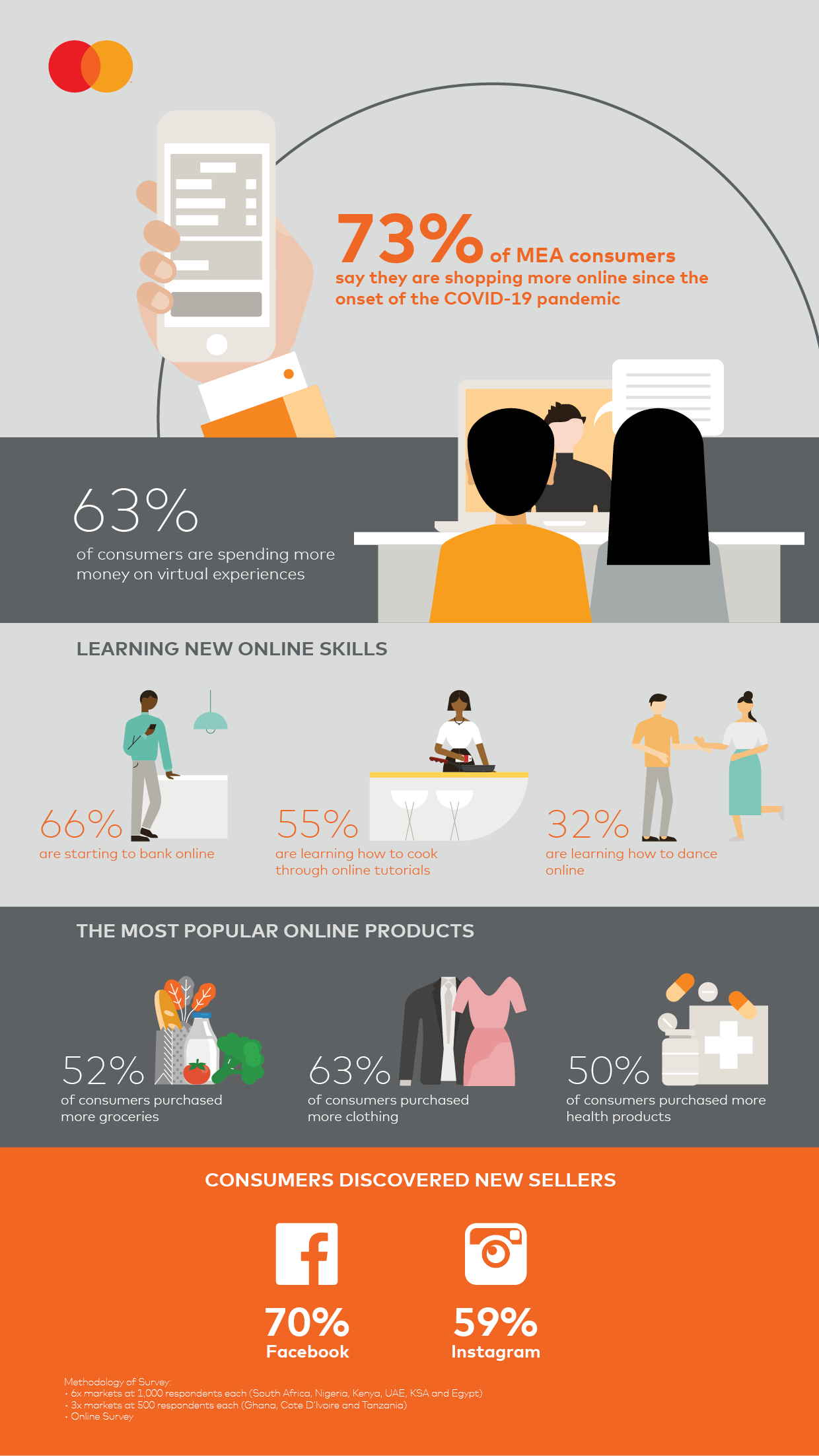73% of Consumers in Middle East and Africa are Shopping More Online Since the Start of Pandemic, Reveals Mastercard Study
November 24, 2020 | Dubai, UAE- Data Top Ups (70%), clothing (63%), and groceries (52%) top the virtual shopping list in the region
- 66% of consumers have embraced online banking, and on average nearly half have used the downtime to upskill on online experiences such as healthcare, cooking, education and more
- Social media has become an integral platform for connecting consumers to online businesses
- Secure checkout experience recognized as fundamental for online shopping
As the global COVID-19 pandemic continues to spur e-commerce, a Mastercard study has revealed the rapid growth of online shopping, with nearly three out of four (73%) consumers in the Middle East and Africa shopping more online than they did before the pandemic.
The study provides significant insights into how shoppers are rapidly moving away from cash and opting for contact-free and digital payment experiences. These insights are helping e-tailers and businesses across the region to leverage the shift towards online shopping and to deliver fast, convenient and secure transactions.
Surge in Spending Across Sectors
According to the survey, data top ups, apparel, groceries, banking and healthcare have seen the highest surge of online activity.
More than 70% of consumers in the Middle East and Africa said they had shopped more online for data top ups, 63% for clothing, and over 52% said they had purchased groceries online. And, as e-commerce increasingly becomes a part of everyday life, consumers are moving other aspects of their financial management to digital, with 66% of respondents having started banking online, and 56% managing their healthcare needs online.
The research also reveals the rising impact of social media on consumer spending habits, with 70% and 59% of respondents saying they had discovered new sellers through Facebook and Instagram respectively.
Mastercard has been working with businesses, financial institutions and other stakeholders to advance digital payments in Kuwait, and the pandemic has reinforced the necessity to continue evolving the safe and secure consumer payment experience. From a simplified online checkout experience to an in-store tap on a contactless terminal, it is evident that being able to respond to the rapidly evolving consumer expectations is a critical priority.
The Rise of Virtual Experiences
While adapting to the ‘next normal’, people have been changing the way they consume entertainment and learn new skills.
In fact, 76% of consumers said they were using the downtime as a positive learning experience. More than half of the respondents (55%) said they had taken a virtual cooking class, 41% have been mastering a new language and 32% have been learning to dance online.
45% of respondents have been educating themselves on Do-It-Yourself (DIY) projects, and 44% said they are enrolling in an online university.
As people spend more time at home, the demand for online entertainment has also surged with 72% of respondents having invested in entertainment subscriptions and virtual stand-up comedy shows, while over five in ten people are spending on online gaming (55%) and virtual music concerts (54%).
Securing New Shopping Habits
With the rapid rise in online shopping, consumers are also becoming increasingly aware of the associated risks. More than half of consumers (62%) surveyed said that a secure checkout was fundamental for a good shopping experience.
This is a key priority for Mastercard, as it is working to reduce online fraud and protect retailers from data breaches, while ensuring that consumers still enjoy a convenient and hassle-free payment experience.
To advance these efforts, Mastercard recently rolled out its patented tokenization technology across the region. Tokenization encrypts consumer data by replacing card numbers with digital tokens. This prevents improper usage at any other location and provides additional security and peace of mind for consumers and merchants alike, resulting in higher approval rates while minimizing online fraud.
